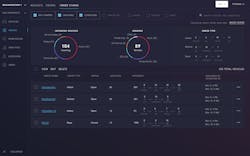A discussion of autonomous vehicles often brings with it fears of widespread job losses for the trucking community. But Sean Behr, co-founder and CEO of Stratim, expects new opportunities for the industry’s technicians.
Maintenance experience and information from trucking fleets “is so valuable right now to the folks dealing with the real-world logistics of car sharing and autonomous vehicles,” Behr said. “This is a natural place for collaboration and discussion.”
Stratim is a start-up based in San Francisco that has raised more than $36 million in funding. It alerts and plans when and where vehicles need to be fueled or have maintenance performed. The company monitors more than 10,000 cars and vans from 50 clients including BMW, Ford, and General Motors.
By the end of this decade, Behr expects a societal shift to be well underway, with more people owning fewer vehicles, instead relying on ride-sharing services that will be at least partially autonomous.
For corporate-owned fleets, “it won’t be enough to know a car needs gas,” Behr said. “The car actually needs to be fueled.”
Behr added one thing will not change – all of these vehicles will require preventative maintenance and emergency repairs. The problems of today will still exist, such as tires needing air and windshields getting dinged up from road debris.
Currently, when an Uber or Lyft vehicle has a problem, it is the personal responsibility of that owner to address the problem at their own expense and on their own time.
He noted that it is the same in the freight transportation space. “When a truck breaks down – the person feeling the pain is the person delivering the freight.”
But what will happen when these vehicles are corporate owned, such as Uber’s announcement in November it will buy up to 24,000 self-driving cars from Volvo?
“Owners of centrally owned vehicles will feel the pain when cars are out of service, unlike what happens now,” he said.
That brings the “interesting parallel” with trucking, Behr said, as these consumer technology businesses get more involved in total vehicle management. Behr said Stratim is not actively involved in heavy-duty trucking, but does work with clients operating vans or light-duty trucks for last-mile and urban deliveries.
“These guys face some of the biggest logistical challenges moving a variety of goods quickly and effectively from warehouses 6 or 7 miles away into crowded downtown areas.” And regardless of the size of the vehicle, “challenges will remain to keep these vehicle going.”
About the Author
Neil Abt
Neil Abt is a former FleetOwner editor who wrote for the publication from 2017 to 2020. He was editorial director from 2018 to 2020.


